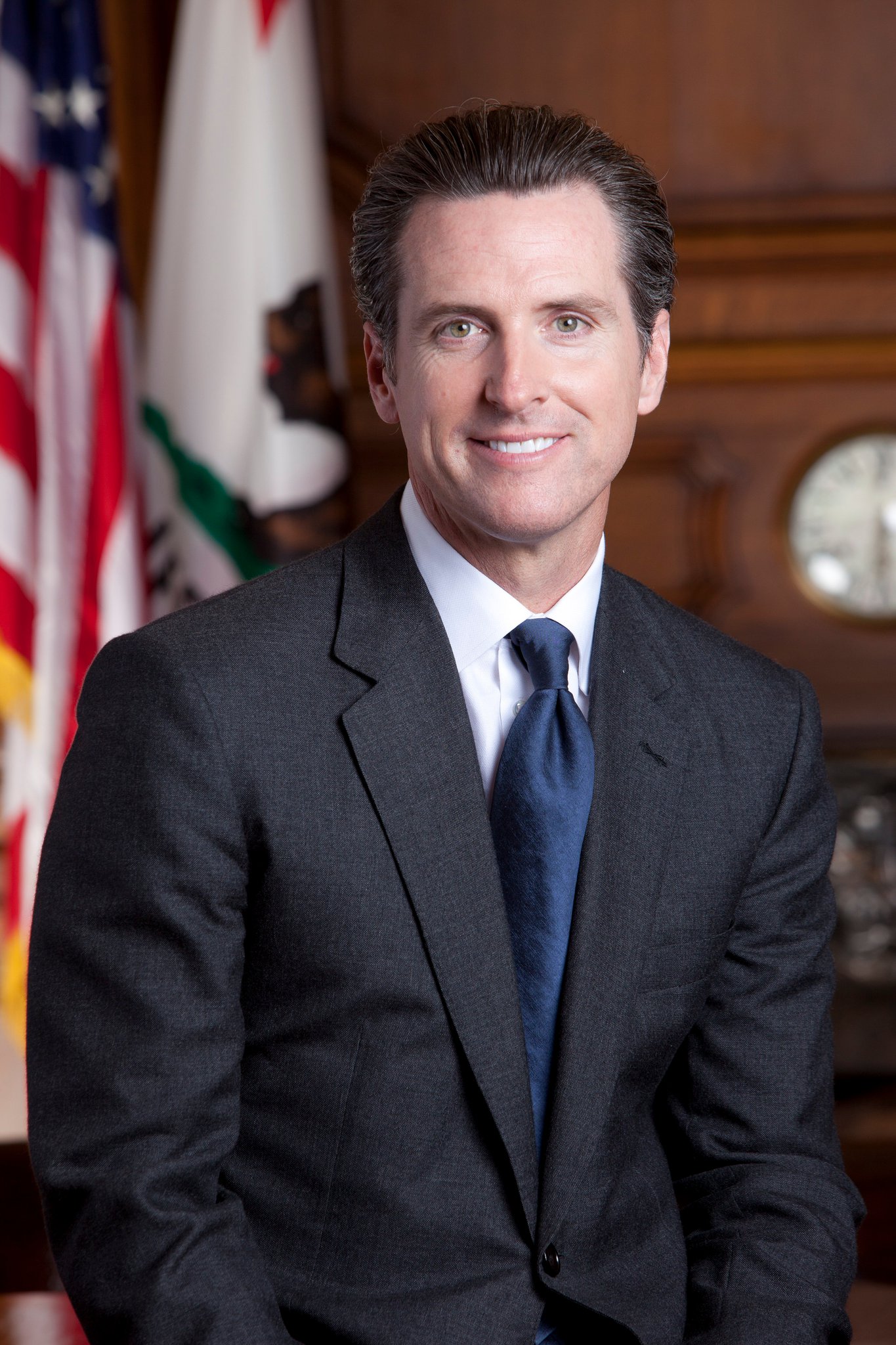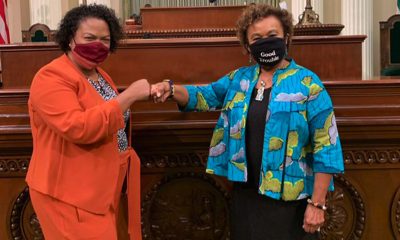Bay Area
Gov. Gavin Newsom Breaks Record With Tens-of-Billions Spending Plan for Public Schools and Community Colleges

On Jan. 10, Gov. Gavin Newsom unveiled his record $222 Billion state budget for 2020-21. The $84 billion he allocated in it for K-12 schools and community colleges represents a historic high level of funding for education in California.
The proposed investment in K-14 education is 3.03 percent or $3.8 billion more than last year. Total K-12 expenditures from all sources in the budget are projected to be $17,964 per pupil.
While state spending on education is at its highest level numerically, Governor Newsom expressed that none of them are “spiking the ball” because education outcomes for many students are not where they should be
“We are making progress, but it is stubborn and slow. We have disparities that are being closed and disparities that are persistent,” said Newsom.
The achievement gap is being closed for Latinx students, students with disabilities, low income students, and African-American students in some metrics. Latinx students narrowed their gap in English language arts scores and high school graduation rates. Students with disabilities made the greatest gains in math and English language arts. African-American students showed the largest graduation rate gain among student groups.
Where progress has been slow has been with students with disabilities, youth in foster care, homeless youth, and African-American students continuing to score below the state standard on English language arts and math tests.
Newsom was very candid in pointing out that 23 low-performing, high-poverty school districts have an over-representation of African-American students.
“It seems self evident that we should focus and concentrate our efforts in those areas in order to address…the substance of the vexing issue as it relates to academic achievement for African-American students.”
“We have to start getting serious and do something about it. We believe the biggest achievement boost is fully prepared teachers,” Newsom said.
The governor is proposing $900.1 million to be invested in workforce investment grants, professional development grants for existing teachers, and teacher recruitment strategies.
“The plan is to build a diverse teaching workforce of stable, prepared professional teachers, including more teachers that look like their students. That’s incredibly important as related particularly to African-American achievement,” Newsom said.
The budget includes $100 million to fund $20,000 stipends for new teachers who choose to teach in high-need schools. This addresses the stubborn fact that high-poverty schools have three times as many unprepared teachers.
$300 million in grants is being made available to close the academic achievement in the lowest-performing districts.
Another $300 million is proposed to expand community schools to address students’ physical and mental health needs by establishing public-private partnerships with community services. The funds will also be used to promote parent engagement.
Special Education in the state of California is in a crisis, according to Newsom. About $900 million dollars is being allocated to increase base funding for Special Ed students, support specific teacher training, fund early diagnosing and intervention and pay for studies on how districts are delivering services to respond to the learning needs of those students.
The budget calls for establishing a new Department of Early Childhood Development to consolidate under one roof the various efforts to implement the governor’s Master Plan for Early Learning and Care, a policy initiative he announced last year.
Newsom is committed to adding 10,000 full-time preschool slots this year and providing universal preschool for all low-income 4-year-olds by the end of next year.
Education leaders’ reactions to the governor’s 2020-21 state budget presentation has been mixed.
“The Governor mentioned that students should have teachers that look more like them, and we couldn’t agree more. We look forward to having the opportunity to invest in our teacher workforce and the pipeline of future teachers coming into the profession, specifically teachers of color and in the fields of science, math, and special education,” Superintendent of Public Instruction Tony Thurmond said.
State Board of Education President Linda Darling Hammond said, “Some students spend the year in classrooms staffed by highly trained, highly prepared teachers. But many others do not.
These disparities are particularly grievous for low-income students of color. The 2020-21 budget investments in educator recruitment and professional development will help place California on solid footing moving forward as we work to build, train and support the kind of high-quality educator workforce all our students need and deserve.”
California Teachers Association President E. Toby Boyd expresses some cynicism.
“Despite California’s economy consistently expanding – now being ranked fifth-largest in the entire world – we have some of the most underfunded schools in the country,” he said. “We rank 39th in the nation in per-pupil funding. We boast the most overcrowded classrooms in the entire country.”
Los Angeles Unified Superintendent Austin Beutner said, “California’s public schools will remain woefully underfunded, especially when compared with the rest of the nation.”
“This budget proposal does not go far enough in funding supports for our most vulnerable students,” Beutner added. “Including students whose families are experiencing homelessness and students with special needs.”
The governor’s presentation begins the formal state budget process. Over the next several months, the California legislature will hold hearings on the budget and special interest groups and the public will have an opportunity to comment on various budget proposals. In mid-May the Governor will release a revised budget plan reflecting changes to spending. The budget will be finalized by the end of June 2020.
Activism
OP-ED: AB 1349 Puts Corporate Power Over Community
Since Ticketmaster and Live Nation merged in 2010, ticket prices have jumped more than 150 percent. Activities that once fit a family’s budget now take significant disposable income that most working families simply don’t have. The problem is compounded by a system that has tilted access toward the wealthy and white-collar workers. If you have a fancy credit card, you get “presale access,” and if you work in an office instead of a warehouse, you might be able to wait in an online queue to buy a ticket. Access now means privilege.

By Bishop Joseph Simmons, Senior Pastor, Greater St. Paul Baptist Church, Oakland
As a pastor, I believe in the power that a sense of community can have on improving people’s lives. Live events are one of the few places where people from different backgrounds and ages can share the same space and experience – where construction workers sit next to lawyers at a concert, and teenagers enjoy a basketball game with their grandparents. Yet, over the past decade, I’ve witnessed these experiences – the concerts, games, and cultural events where we gather – become increasingly unaffordable, and it is a shame.
These moments of connection matter as they form part of the fabric that holds communities together. But that fabric is fraying because of Ticketmaster/Live Nation’s unchecked control over access to live events. Unfortunately, AB 1349 would only further entrench their corporate power over our spaces.
Since Ticketmaster and Live Nation merged in 2010, ticket prices have jumped more than 150 percent. Activities that once fit a family’s budget now take significant disposable income that most working families simply don’t have. The problem is compounded by a system that has tilted access toward the wealthy and white-collar workers. If you have a fancy credit card, you get “presale access,” and if you work in an office instead of a warehouse, you might be able to wait in an online queue to buy a ticket. Access now means privilege.
Power over live events is concentrated in a single corporate entity, and this regime operates without transparency or accountability – much like a dictator. Ticketmaster controls 80 percent of first-sale tickets and nearly a third of resale tickets, but they still want more. More power, more control for Ticketmaster means higher prices and less access for consumers. It’s the agenda they are pushing nationally, with the help of former Trump political operatives, who are quietly trying to undo the antitrust lawsuit launched against Ticketmaster/Live Nation under President Biden’s DOJ.
That’s why I’m deeply concerned about AB 1349 in its current form. Rather than reining in Ticketmaster’s power, the bill risks strengthening it, aligning with Trump. AB 1349 gives Ticketmaster the ability to control a consumer’s ticket forever by granting Ticketmaster’s regime new powers in state law to prevent consumers from reselling or giving away their tickets. It also creates new pathways for Ticketmaster to discriminate and retaliate against consumers who choose to shop around for the best service and fees on resale platforms that aren’t yet controlled by Ticketmaster. These provisions are anti-consumer and anti-democratic.
California has an opportunity to stand with consumers, to demand transparency, and to restore genuine competition in this industry. But that requires legislation developed with input from the community and faith leaders, not proposals backed by the very company causing the harm.
Will our laws reflect fairness, inclusion, and accountability? Or will we let corporate interests tighten their grip on spaces that should belong to everyone? I, for one, support the former and encourage the California Legislature to reject AB 1349 outright or amend it to remove any provisions that expand Ticketmaster’s control. I also urge community members to contact their representatives and advocate for accessible, inclusive live events for all Californians. Let’s work together to ensure these gathering spaces remain open and welcoming to everyone, regardless of income or background.
Activism
Oakland Post: Week of December 31, 2025 – January 6, 2026
The printed Weekly Edition of the Oakland Post: Week of – December 31, 2025 – January 6, 2026

To enlarge your view of this issue, use the slider, magnifying glass icon or full page icon in the lower right corner of the browser window.
Activism
Big God Ministry Gives Away Toys in Marin City
Pastor Hall also gave a message of encouragement to the crowd, thanking Jesus for the “best year of their lives.” He asked each of the children what they wanted to be when they grow up.

By Godfrey Lee
Big God Ministries, pastored by David Hall, gave toys to the children in Marin City on Monday, Dec. 15, on the lawn near the corner of Drake Avenue and Donahue Street.
Pastor Hall also gave a message of encouragement to the crowd, thanking Jesus for the “best year of their lives.” He asked each of the children what they wanted to be when they grew up.
Around 75 parents and children were there to receive the presents, which consisted mainly of Gideon Bibles, Cat in the Hat pillows, Barbie dolls, Tonka trucks, and Lego building sets.
A half dozen volunteers from the Big God Ministry, including Donnie Roary, helped to set up the tables for the toy giveaway. The worship music was sung by Ruby Friedman, Keri Carpenter, and Jake Monaghan, who also played the accordion.
Big God Ministries meets on Sundays at 10 a.m. at the Mill Valley Community Center, 180 Camino Alto, Mill Valley, CA Their phone number is (415) 797-2567.
-

 Activism3 weeks ago
Activism3 weeks agoDesmond Gumbs — Visionary Founder, Mentor, and Builder of Opportunity
-

 Activism3 weeks ago
Activism3 weeks agoFamilies Across the U.S. Are Facing an ‘Affordability Crisis,’ Says United Way Bay Area
-

 Alameda County3 weeks ago
Alameda County3 weeks agoOakland Council Expands Citywide Security Cameras Despite Major Opposition
-

 Alameda County3 weeks ago
Alameda County3 weeks agoBling It On: Holiday Lights Brighten Dark Nights All Around the Bay
-

 Activism3 weeks ago
Activism3 weeks agoBlack Arts Movement Business District Named New Cultural District in California
-

 Activism3 weeks ago
Activism3 weeks agoLu Lu’s House is Not Just Toying Around with the Community
-

 Activism4 weeks ago
Activism4 weeks agoOakland Post: Week of December 17 – 23, 2025
-

 Activism2 weeks ago
Activism2 weeks agoFirst 5 Alameda County Distributes Over $8 Million in First Wave of Critical Relief Funds for Historically Underpaid Caregivers












































